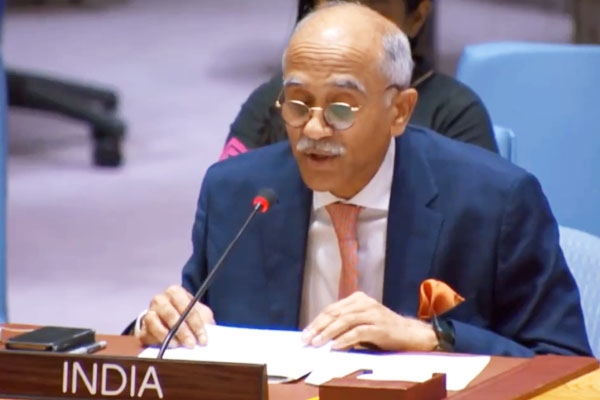
(Image source from: Twitter.com/IndiaUNNewYork)
On Saturday, India condemned Pakistan for its "disinformation" regarding the Indus Waters Treaty, which was put on hold following a fatal terrorist incident in Pahalgam, Jammu and Kashmir, last month. Ambassador Parvathaneni Harish, India’s Permanent Representative to the UN, emphasized that this treaty, in place for 65 years, will stay inactive unless Pakistan, recognized as a "global epicenter of terror," ceases its backing of cross-border terrorism. His comments were triggered by the Pakistani representative's remarks at the UN, highlighting that "water is life and not a weapon of war." India had suspended the Indus Waters Treaty, signed in 1960, on April 23, just a day after the Pahalgam attack, which resulted in 26 fatalities. This suspension followed New Delhi's discovery of "cross-border linkages" related to this heinous act. “India has consistently demonstrated responsibility as an upper riparian state,” Mr. Harish stated, while outlining four critical points that “revealed” Pakistan's actions.
“Firstly, India engaged in the Indus Water Treaty 65 years ago in good faith, with the preamble reflecting a spirit of friendship. Over the decades, however, Pakistan has breached the essence of this agreement by waging three wars and unleashing countless terrorist assaults on India,” he noted. Mr. Harish mentioned that over the past four decades, more than 20,000 Indians have lost their lives to terrorist acts. He remarked on India’s “extraordinary patience and generosity” during this time, asserting that “state-sponsored cross-border terrorism by Pakistan attempts to hold civilian lives, religious harmony, and economic growth hostage.”
“Secondly, within these 65 years, significant and fundamental transformations have occurred, not only regarding heightened security threats from cross-border terrorism but also regarding the need for clean energy production, climate change, and demographic shifts,” the Indian Ambassador expressed. “Advancements in dam infrastructure technology have occurred, aimed at enhancing operational safety and water efficiency. Some older dams now face serious safety issues. Yet, Pakistan has persistently obstructed any alterations to this infrastructure and any permissible revisions under the treaty,” he pointed out, recalling the 2012 attack on the Tulbul navigation project in Jammu and Kashmir by terrorists.
“These malicious acts pose ongoing risks to the safety of our projects and the lives of civilians,” he continued. “Thirdly, India has formally requested discussions with Pakistan regarding modifications on multiple occasions over the past two years. Nonetheless, Pakistan has consistently dismissed these proposals, and its obstructive stance hampers India's ability to fully exercise its legitimate rights,” he stated. “Fourthly, it is against this backdrop that India has decisively announced the treaty will remain in abeyance until Pakistan, which is a global hub for terror, credibly and irrevocably halts its support for cross-border terrorism,” Mr. Harish concluded.
"It is evident that Pakistan is the one breaching the Indus Waters Treaty," he stated. The conflict between India and Pakistan has escalated after the Pahalgam incident. Upon discovering connections to the attack across the border, India initiated "Operation Sindoor" on May 7, targeting terrorist training camps in both Pakistan and Pakistan-occupied Kashmir (PoK). In response, Pakistan conducted a significant missile and drone offensive, but these threats were successfully countered. In an act of retaliation, Indian troops targeted air bases within Pakistan. A ceasefire on May 10 brought an end to the fighting.



















